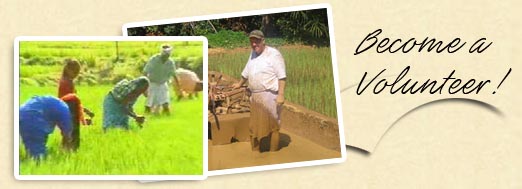|
There are organic ways of dealing with problems, then why not be good to ourselves and the soil too at the same too.... This means drawing energy from clean sources, like appreciation and inspiration, not from polluting pressures such as stress and fear. It means composting our problems so that waste becomes a major source of future growth - turning our negative feelings into constructive output. From crop rotation, to the natural cycles of growth, to achieving real quality - nutrition and satisfaction - in our outputs, we must follow the organic way to live a life of health. It is high time that we open our eyes to the fact that the earth operates as a self-renewing organism. Explaining the concept of cultivated natural systems as a model for sustained productivity. Understanding aspects of soil condition, eg organic content, structure, depth, soil types, and translating these to the growth of a healthy beginning - The Organic Revolution - Try it and you will never regret that you even wished to try it! Organic agriculture was developed as a farming practice in the early twentieth century. Through its holistic nature organic farming integrates wild diversity, bio-diversity, and soil conservation and takes low intensity, extensive farming one step further by eliminating the use of chemical fertilizers and pesticides. This is not only an improvement for human health, but also for the fauna and flora associated with the farm and farm environment.
Organic Agriculture at Bev
More than 20 million hectares of land is certified for organic production worldwide, generally producing for a premium price market. The number of not certified farms using organic techniques is unknown but is likely to be much larger than for land under certified production. Generally these farms are in developing countries producing primarily for home consumption or for local sale, where there is no need for the guarantees of a certification system. Because organic farming is a system of agriculture
that relies largely on locally available resources and is dependent
upon maintaining ecological balances and developing biological processes
to their optimum, in general, organic farms are likely to have higher
biodiversity with greater crop rotation diversity, integration of livestock
and number of cultivated crops. Higher levels of biodiversity can strengthen
farming systems and practices; for instance, wild species can perform
a variety of ecological services within organic systems, such as pollinators
and natural enemies of pests.
Crop Diversity At Bev over 50 acres of fertile mountain valley lands are gravity flow irrigated by natural stream waters to grow robust organic crops of rice, corn, mung dahl, sugar cane, tapioca, ginger, turmeric, pineapple, banana, black pepper, medicinal herbs, cardamom, keenwa, and many more. We aim at self-sufficiency depending on sustenance from the land, the cows and God.
Literally hundreds of fruit bearing, flowering, and medicinal trees have been established boasting such types as mango, sapota, fig, coconut, cashew, avocado, citrus, jackfruit, breadfruit, lychee, pomegranate, cherry, rose apple, mulberry and jamun, just to name a few. Many other special plants like parijata, champak, jasmine, orchids, kadamba, nutmeg, clove, cinnamon, allspice have been planted and new varieties are added every year. Techniques Used Traditional techniques of perm culture, composting, companion cropping, mulching, crop rotation, green manuring, and other organic methods are being experimented with successfully. Bullock Power Bullocks are used for plowing, transportation, and
extraction of agriculture produce and generation of energy. Use of the
breeds Red Sindhi Cows and Kagiyan Bullocks have so far been satisfactorily
established. A program to distribute improved bulls and cows to the
local population of farmers has begun with the purpose of upgrading
the herds in the vicinity for increased agricultural productivity.
|
|
Bev Society Registered Office: Garuda Guha, Kollur,
Udupi Dist, Karnataka, India - 576220 |


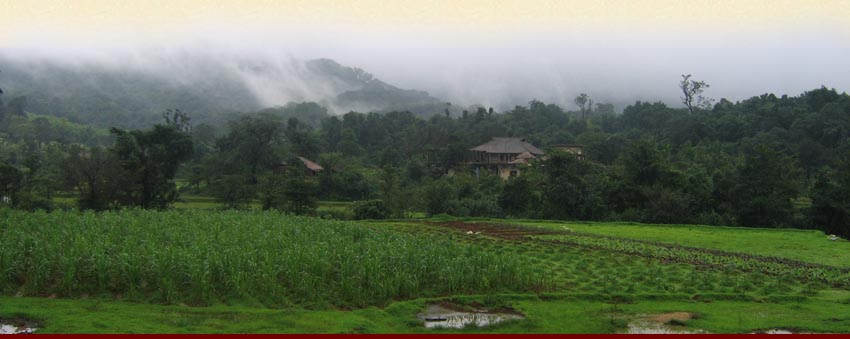
 Organic
agriculture, as followed at Bev, includes all agricultural systems that
promote environmentally, socially and economically sound production
of food and fibres. These systems take soil fertility as a key to successful
production. By respecting the natural capacity of plants, animals and
the landscape, it aims to optimise quality in all aspects of agriculture
and the environment. Organic agriculture dramatically reduces external
inputs by refraining from the use of chemo-synthetic fertilisers, pesticides
and pharmaceuticals. Instead it allows the laws of nature to increase
both agricultural yields and disease resistance. Organic agriculture
adheres to globally accepted principles, which are implemented within
local social-economic, climatic and cultural settings. As a logical
consequence, Bev stresses and supports the development of self-supporting
systems on local and regional levels.
Organic
agriculture, as followed at Bev, includes all agricultural systems that
promote environmentally, socially and economically sound production
of food and fibres. These systems take soil fertility as a key to successful
production. By respecting the natural capacity of plants, animals and
the landscape, it aims to optimise quality in all aspects of agriculture
and the environment. Organic agriculture dramatically reduces external
inputs by refraining from the use of chemo-synthetic fertilisers, pesticides
and pharmaceuticals. Instead it allows the laws of nature to increase
both agricultural yields and disease resistance. Organic agriculture
adheres to globally accepted principles, which are implemented within
local social-economic, climatic and cultural settings. As a logical
consequence, Bev stresses and supports the development of self-supporting
systems on local and regional levels. 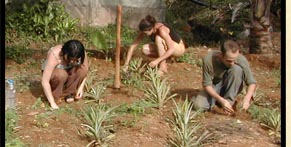
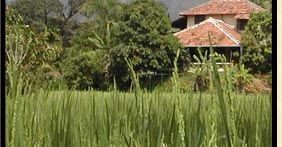
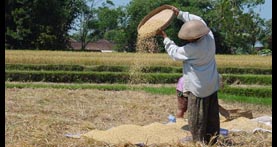
 Variety
of plants
Variety
of plants
